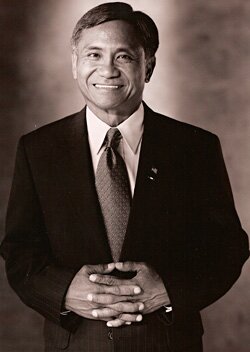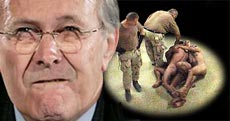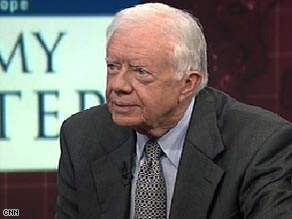MASSACHUSETTS SCHOOL OF LAW AT ANDOVER
Bush Claims More Powers Than King George III,
Constitutional Scholar David Adler Contends
The Bush administration has arrogated powers to itself that the British people even refused to grant King George III at the time of the Revolutionary War, an eminent political scientist says.
“No executive in the history of the Anglo-American world since the Civil War in England in the 17th century has laid claim to such broad power,” said David Adler, a prolific author of articles on the U.S. Constitution. “George Bush has exceeded the claims of Oliver Cromwell who anointed himself Lord Protector of England.”
Adler, a professor of political science at Idaho State University at Pocatello, is the author of “The Constitution and the Termination of Treaties”(Taylor & Francis), among other books, and some 100 scholarly articles in his field. Adler made his comments comparing the powers of President Bush and King George III at a conference on “Presidential Power in America” at the Massachusetts School of Law, Andover, April 26th.
Adler said, Bush has “claimed the authority to suspend the Geneva Convention, to terminate treaties, to seize American citizens from the streets to detain them indefinitely without benefit of legal counseling, without benefit of judicial review. He has ordered a domestic surveillance program which violates the statutory law of the United States as well as the Fourth Amendment.”
Adler said the authors of the U.S. Constitution wrote that the president “shall take care to faithfully execute the laws of the land” because “the king of England possessed a suspending power” to set aside laws with which he disagreed, “the very same kind of power that the Bush Administration has claimed.”
Former Attorney General Alberto Gonzalez, Adler said, repeatedly referred to the President’s “override” authority, “which effectively meant that the Bush Administration was claiming on behalf of President Bush a power that the English people themselves had rejected by the time of the framing of the Constitution.”
Adler said the Framers sought an “Administrator in Chief” that would execute the will of Congress and the Framers understood that the President, as Commander-in-Chief “was subordinate to Congress.” The very C-in-C concept, the historian said, derived from the British, who conferred it on one of their battlefield commanders in a war on Scotland in 1639 and it “did not carry with it the power over war and peace” or “authority to conduct foreign policy or to formulate foreign policy.”
That the C-in-C was subordinate to the will of Congress was demonstrated in the Revolutionary War when George Washington, granted that title by Congress, “was ordered punctually to respond to instructions and directions by Congress and the dutiful Washington did that,” Adler said.
Adler said that John Yoo, formerly of the Office of Legal Counsel, wrote in 2003 that the President as C-in-C could authorize the CIA or other intelligence agencies to resort to torture to extract information from suspects based on his authority. However, Adler said, the U.S. Supreme Court in 1804 in Little vs. Barreme affirmed the President is duty-bound to obey statutory instructions and reaffirmed opinion two years later in United States vs. Smith.
“In these last eight years,” Adler said, “we have seen presidential powers soar beyond the confines of the Constitution. We have understood that his presidency bears no resemblance to the Office created by the Framers… This is the time for us to demand a return to the constitutional presidency. If we don’t, we will have only ourselves to blame as we go marching into the next war as we witness even greater claims of presidential power.”
The Massachusetts School of Law is a non-profit educational institution purposefully dedicated to providing an affordable, quality legal education to minorities, immigrants, and students from economic backgrounds that would not otherwise be able to afford to attend law school and enter the legal profession.
Read moreBush Claims More Powers Than King George III











